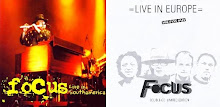In 1974 Jan Akkerman’s third solo album Tabernakel appeared. I was 15 and, at first, unsure what to make of it. I'd been converted and baptised a little before. At the time we were studying Exodus in Sunday afternoon Bible Class and a large model of the Tabernacle dominated the room where we met. Now here was an album by my favourite guitarist with the very same word as its title. Not only that, but the cover artwork had him in a distinctly messianic pose (Akkerman himself later told me it wasn't his idea. The picture on the cover of abum before, Profile, has been compared to the Turin Shroud).
The thing that first drew me to the music of Focus, then individual band members, was the predominance of instrumental numbers in the repertoire. It seemed to me to solve the problem of lyrics that would today require parental advisory stickers or that promoted unbiblical ideas. Instinct kept me from Led Zeppelin or Black Sabbath (though friends kept trying to show me the Christian content in Sabbath lyrics). Later albums were not without problems (a dodgy cover, a swear word) but the difficulty was very much minimised.
It would take too long to explain the conflicting feelings of an evangelical teenager with leanings to fundamentalism confronted by a rock album with a definite religious feel from start to finish. Suffice to say the listening experience was something incredible and put to rest my fears. A superb album of solo lute, through acapella choir and rocked up sitar, to straight rock, Tabernakel is in my opinion Akkerman’s best. This is due in no small degree to its strong religious dimension.
The title and closing Amen are overtly religious but there are other elements. One track is called Javeh, a form of the Hebrew word for God as is I am which features in the Lammy suite. (On the title Javeh Akkerman said in a 1973 interview in Dutch “Well, that is the biblical name for our Lord. When I wrote it, and that happens to me very often, I had the feeling I wasn’t actually writing it myself. It was on my farm in Friesland, among the animals and flowers, in full Spring. The song starts in a very frustrated way, because when you look around you, you realise you are in trouble after all, that’s why it’s called Javeh.”). There's also Anthony Holborne’s Last Will and Testament and not forgetting House of the King! This album confirms that the religious input evident on Focus albums, eg Hamburger Concerto (with a Dutch Christmas carol and its own ‘Amen’ on La Cathedrale de Strasbourg), was not all coming from Thijs van Leer (who went on to record albums of hymn tunes and a modern mass) despite what Akkerman has sometimes implied.
He once said of Focus, "Coming from Europe there's always a greater awareness that we will be moulded by the church. I think the idea was to make blues out of neoclassical church-like harmonies; that's actually what we did. The song Answers? Questions! Questions? Answers! [Focus 3] was like being in church. The singer is out front and the choir answers." He has referred to the track Eruption as churchy and sacral but like a flea market in its eclecticism.
The truth is that one sees evidence of this religious element throughout Akkerman’s catalogue. From Exodus (his first single) and the gospel song Mercy, mercy, mercy on the debut solo album (Guitar for sale) through to the album Passion, with its religious double entendre (punning is an Akkerman penchant). The Bach tune that is the title track is often sung to the words O sacred head sore wounded. The album is about the Passion not just earthly passions. Bach’s influence, of course, has been openly acknowledged with Where would I be? (Focus in Time) and the earlier Father Bach (Mother Focus). Bach almost inevitably brings a religious dimension to any composer’s work.
Other titles where religious themes surface are the incomplete Spoke the Lord Creator (Ship of Memories); Nightprayer (Jan Akkerman 3); Fire from heaven (Heartware); Waterfalls of Eden, Communion and procession (Pleasure Point bonus tracks); Cherubim and Sepharim (Seraphim?! From the Basement bonus track); Virgin Mary (Blues Hearts); Hineimatov [Psalm 133] (Guitar For Sale); The fight and Happy Gabriël? (Profile); Everything must change (Can’t stand noise); David’s harp (Passion).
Spoke the Lord Creator was later given pseudo-religious words reminiscent of the Raamses Shaffy hit on which Focus played, called The shrine of God.
Spoke the Lord Creator was later given pseudo-religious words reminiscent of the Raamses Shaffy hit on which Focus played, called The shrine of God.
I'm confining myself to Judaeo-Christian references. Perhaps other traditions are there (eg on the collaboration with Buddhist Tony Scott which includes Under the bo tree). For me it's the way the more religious element is either blended with or juxtaposed to solid rock and other genres that is attractive. A classic example is Leading me there (Focus in Time). Akkerman comments ‘I have always taken great pride in metaphorically racing a motorbike through a church’ which often means blues over Bach but is here blues over Mozart. The same philosophy is evident on Love is uneven (Puccini's Cafe) ‘a sort of sacro popsong where you can actually see crusaders on horseback change into wild motor-biking herds.’ Another example is a title like Apocalypso (Transparental). A DVD containing footage from the eighties begins with Jan in a church playing lute then cuts to him doing a straight rock concert with his band.
The approach offends some. Focus received complaints from the Bach Society for what they did. However, religion is two-sided. It can do great good or great harm. The Lord Jesus spoke against religious people in his day. Akkerman says he probably inherited a dislike for churchianity from his father and it is reflected in the music. Such dislike, though not saving, can be healthy.
Akkerman is unusual in combining a strong religious element with rock music but not unique. Think of obvious examples such as Madonna or Prince. Someone with such broad musical tastes inevitably use religious music and I am aware that there are many other sides to his output. However, this element is an important but easily overlooked part of what makes his body of work the phenomenon it is.
Since writing the above I have discovered that one of the very first records featuring Akkerman and van Leer (both having Jewish roots) was Woord voor Woord where the actor Aart Staartjes tells the story of Moses and our two maestros provide the music. The sleeve notes are by a Rev Wim Koole and reveal that the contents were successfully broadcast on Dutch TV in 1969. I knew I was on to something!
























1 comment:
Hey, Brother Brady!
I'd love to connect with you. I write reviews of Christian and spiritually-oriented music for two websites (The Phantom Tollbooth and www.Soul-Audio.com ).
Please check out the sites! By the way - Focus and Procol Harum are two of my favorite bands.
Post a Comment